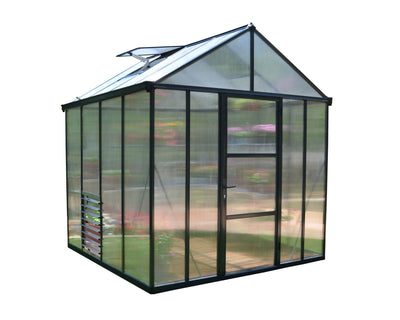How to Speed Up Composting: Fast Decomposition Tips
Composting is an excellent way to recycle organic waste, improve soil health, and reduce landfill waste, but one common challenge many gardeners face is slow decomposition. While compost will eventually break down on its own, there are several ways to speed up the process and produce nutrient-rich compost faster.
By maintaining the right balance of materials, improving airflow, and using natural accelerators, you can turn kitchen scraps and garden waste into compost in a fraction of the time. This guide covers the best techniques to help you achieve fast, efficient composting.
1. Balance Greens and Browns for Optimal Breakdown
The key to fast composting is ensuring the right mix of greens (nitrogen-rich materials) and browns (carbon-rich materials). A well-balanced pile allows microorganisms to break down materials efficiently, preventing delays in decomposition.
What Are Greens and Browns?
-
Greens (Nitrogen Sources): Kitchen scraps, grass clippings, coffee grounds, fresh leaves, and vegetable peels.
-
Browns (Carbon Sources): Dry leaves, shredded cardboard, sawdust, straw, and newspaper.
Ideal Compost Ratio for Fast Breakdown
For quick decomposition, aim for a ratio of 2 to 3 parts browns to 1 part greens. Too many greens create a wet, smelly pile, while too many browns slow down decomposition.
Regularly mixing greens and browns keeps the compost active and encourages beneficial microbes to work faster.
2. Chop or Shred Materials for Faster Breakdown
The smaller the pieces, the faster they decompose. Large items take longer to break down, so cutting or shredding materials increases the surface area for microbes to work on.
How to Speed Up Compost by Reducing Size:
-
Chop fruit and vegetable scraps into smaller pieces before adding them.
-
Shred dry leaves and cardboard using a mulching mower or shredder.
-
Break up branches and woody materials to prevent them from slowing down the pile.
Pre-processing your compost materials helps microbes break them down quickly, leading to faster, richer compost.
3. Turn the Compost Pile Regularly to Improve Aeration
Oxygen is essential for the microorganisms responsible for decomposition. Without proper airflow, compost piles can become anaerobic, leading to slow breakdown and unpleasant odours.
How to Improve Aeration:
-
Turn the pile every 7–10 days using a pitchfork or compost aerator.
-
Ensure air pockets by mixing in bulky materials like twigs or straw.
-
Use a compost bin with built-in aeration to maintain airflow naturally.
Regular turning introduces oxygen, speeds up microbial activity, and prevents compacted, slow-decomposition piles.
4. Use Natural Compost Accelerators
Compost accelerators introduce extra bacteria and fungi to the pile, boosting decomposition speed. These are especially helpful when starting a new compost pile or when decomposition has slowed.
Best Natural Compost Accelerators:
-
Grass clippings and manure – High in nitrogen, helping activate decomposition.
-
Finished compost or garden soil – Adds beneficial microbes to the pile.
-
Molasses or sugar water – Feeds microbes, speeding up their activity.
-
Compost tea – A liquid booster that spreads beneficial bacteria throughout the pile.
Using compost accelerators jumps-starts decomposition and keeps the pile active and productive.
5. Maintain the Right Moisture Level
Moisture is essential for fast decomposition, as composting microbes need water to break down organic matter efficiently. However, too much or too little moisture can slow the process.
How to Keep Compost Moisture Balanced:
-
The pile should feel like a damp sponge—moist but not soggy.
-
If the compost is too dry, add more greens (kitchen scraps, grass clippings) or water to boost microbial activity.
-
If the compost is too wet, mix in extra browns (dry leaves, cardboard, straw) to absorb excess moisture.
Keeping the right balance ensures steady decomposition and prevents unwanted odours or mold growth.
6. Layer Materials for Faster Breakdown
Layering compost materials optimises decomposition speed by ensuring a balanced mix of greens and browns while maintaining airflow.
Best Layering Technique for Quick Composting:
-
Start with a layer of coarse brown material (twigs, straw) to improve drainage.
-
Add a layer of greens (vegetable scraps, fresh grass clippings).
-
Follow with a thin layer of soil or finished compost to introduce beneficial microbes.
-
Repeat the process, keeping the pile aerated and well-mixed.
Layering helps maintain the ideal compost conditions and keeps the pile actively breaking down.
7. Choose the Right Composter for Maximum Efficiency
The type of composter you use can significantly affect decomposition speed. A high-quality compost bin or tumbler creates the perfect environment for rapid composting while keeping pests out.
Best Composting Options for Faster Breakdown:
Compost Tumblers
-
Designed for quick, efficient composting with easy turning.
-
Keeps the pile aerated, reducing the need for manual mixing.
-
Ideal for small spaces and urban gardens.
Insulated Compost Bins
-
Retain heat to speed up decomposition, even in colder months.
-
Help regulate moisture and airflow.
-
Suitable for high-volume composting.
Open Pile Composting (For Larger Gardens)
-
Allows for natural decomposition but requires regular turning for best results.
-
Works best with large amounts of garden waste.
Choosing a well-designed composter ensures faster, more efficient breakdown of organic material while keeping your composting process clean and hassle-free.
Speeding up composting is all about balancing materials, improving airflow, and maintaining moisture. By using natural accelerators, turning the pile regularly, and choosing the right composter, you can produce rich, healthy compost in a shorter time.
A high-quality composter makes the process easier and more efficient, helping you enjoy the benefits of faster decomposition and nutrient-rich soil for your garden.
















